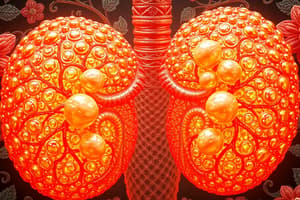Podcast
Questions and Answers
What is the primary factor contributing to the formation of urinary calculi?
What is the primary factor contributing to the formation of urinary calculi?
- High intake of soluble salts
- Low temperature environments
- Lack of dietary inhibitors (correct)
- Increased water consumption
Which type of stone is most commonly formed in the kidneys?
Which type of stone is most commonly formed in the kidneys?
- Cystine stones
- Calcium oxalate/phosphate stones (correct)
- Uric acid stones
- Struvite stones
What role does nucleation play in urinary calculi formation?
What role does nucleation play in urinary calculi formation?
- It prevents crystal formation
- It is the initial step in crystal formation (correct)
- It increases fluid intake
- It aids in the dispersion of crystals
Struvite stones are linked to which condition?
Struvite stones are linked to which condition?
What dietary factor contributes significantly to the crystallization process leading to urinary calculi?
What dietary factor contributes significantly to the crystallization process leading to urinary calculi?
Flashcards are hidden until you start studying
Study Notes
Urinary Calculi Overview
- Kidney stones are formed by crystals ranging in size from small to large
- Stones can lodge anywhere in the urinary tract, causing obstruction and potential kidney damage
- Excruciating pain occurs when crystals scrape against the ureter lining, leading to significant irritation
- Urinary calculi are a common cause of upper urinary tract obstruction; approximately 1 in 11 individuals in the U.S. experience them
Terminology
- Lithiasis: Stone formation
- Nephrolithiasis: Stones formed in the kidney
- Urolithiasis: Stones formed in other areas of the urinary tract (e.g., bladder)
Pathophysiology
- Kidneys normally balance conserving water with eliminating poorly soluble materials (e.g., calcium salts)
- Factors affecting this balance include diet, environmental temperature, and activity levels
- Inhibitory substances like pyrophosphate, citrate, and glycoproteins prevent stone formation
- Contributing factors to urolithiasis:
- Supersaturation: High concentration of insoluble salts leads to crystal formation
- Nucleation: Formation of a crystal from liquid
- Lack of Inhibitors: Absence of substances that prevent crystallization
Crystal Formation
- Crystals can either disperse or form stable bonds, leading to stone development
- Stones can form around an organic matrix (mucoprotein nucleus)
- Conditions leading to crystallization include high insoluble salt intake and decreased fluid intake (e.g., during sleep)
Composition of Calculi
- Calcium Oxalate/Phosphate: 75-80% of stones; linked to high calcium levels
- Uric Acid Stones: High uric acid concentration; more common in men; associated with gout
- Struvite Stones: Linked to urinary tract infections (UTIs) caused by urease-producing bacteria (e.g., Proteus)
- Cystine Stones: Rare; associated with a genetic defect
Studying That Suits You
Use AI to generate personalized quizzes and flashcards to suit your learning preferences.


